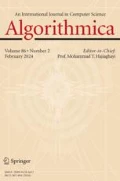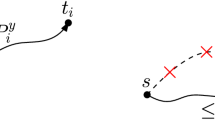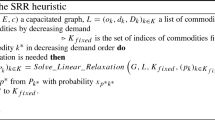Abstract
In traditional multi-commodity flow theory, the task is to send a certain amount of each commodity from its start to its target node, subject to capacity constraints on the edges. However, no restriction is imposed on the number of paths used for delivering each commodity; it is thus feasible to spread the flow over a large number of different paths. Motivated by routing problems arising in real-life applications, e.g., telecommunication, unsplittable flows have moved into the focus of research. Here, the demand of each commodity may not be split but has to be sent along a single path. In this paper a generalization of this problem is studied. In the considered flow model, a commodity can be split into a bounded number of chunks which can then be routed on different paths. In contrast to classical (splittable) flows and unsplittable flows, the single-commodity case of this problem is already NP-hard and even hard to approximate. We present approximation algorithms for the single- and multi-commodity case and point out strong connections to unsplittable flows. Moreover, results on the hardness of approximation are presented. In particular, we show that some of our approximation results are in fact best possible, unless P = NP.
Similar content being viewed by others
Author information
Authors and Affiliations
Corresponding authors
Rights and permissions
About this article
Cite this article
Baier, G., Köhler, E. & Skutella, M. The k-Splittable Flow Problem. Algorithmica 42, 231–248 (2005). https://doi.org/10.1007/s00453-005-1167-9
Received:
Revised:
Published:
Issue Date:
DOI: https://doi.org/10.1007/s00453-005-1167-9




